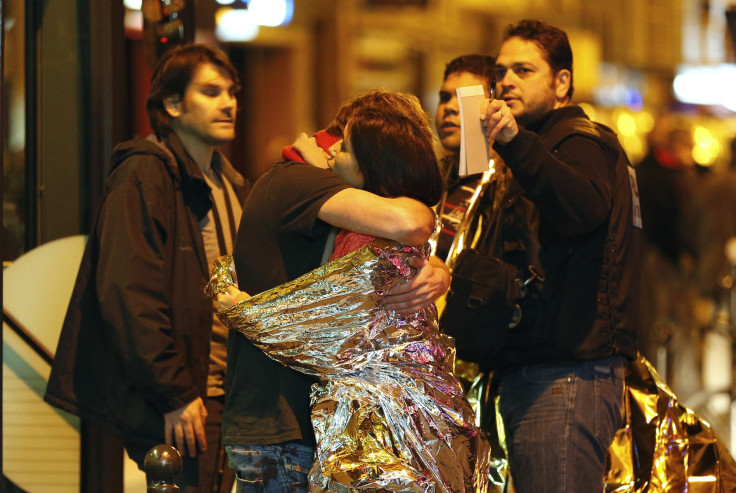Paris Attacks: ISIS Supporters Celebrate Terror Triumph

BEIRUT -- As France reeled from the terrorist attacks in Paris on Friday night, and as people around the globe took to social media to express their horror and dismay, one slice of social media in the Arab world celebrated the carnage as a historic triumph. “Remember the 14th of November Paris,” one supporter of the Islamic State group declared on Twitter. “It will be established in their minds like 11 September to the Americans.”
Another online social media channel used by supporters of the group -- also known as ISIS or ISIL -- posted a photo of an ISIS convoy with the caption, written in French: "Allah defends his servants Hollande,” a reference to the French president, “and the proof is that you are not powerless in the face of his power and the power of his soldiers. We will humiliate you, oh pigs of France.”
Hours after the attack began, a social media post circulated online of an alleged martyrdom testimony from an ISIS member who took part in the Paris atrocities. International Business Times could not independently confirm its authenticity. No organization has yet claimed responsibility for the Paris attacks.
وصية الاستشهادي ابو طلحة الفرنسي تقبله الله #باريس #فرنسا_تشتعل #Paris #Prayers4Paris #الدولة_الإسلامية pic.twitter.com/N4CksKqnIe
— نرجس الإسلام (@tamtot258) November 13, 2015As of late Friday, ISIS had not officially claimed responsibility for the Paris attacks. When ISIS does make such claims for terrorist attacks, the militant group typically circulates a video, audio recording or written statement outlining the details while issuing a justification for its execution. As in the rest of the world, the majority of the Arab conversation featured condemnation of the attacks and sympathy for those who lost their lives. On Lebanese social media, people posted condolences for the victims of the Paris attacks.
برج إيفل مطفأً .. حداداً #باريس pic.twitter.com/vMQHjSvdDO
— شبكة نافذة لبنان (@lebanonwindow) November 14, 2015Solidarity with Paris also came from Syria on Friday night. Media activists in Kafranbel, a town in Syria that has become renowned for making giant posters and signs condemning Syrian regime attacks, posted this to their Facebook page:
“Our prayers go to France as we stand in solidarity with the French people, offering our deepest condolences to the families of those murdered in these simultaneous attacks across Paris. May all of the victims rest in peace.”
In Gaza, an area that has seen a multitude of similar atrocities, residents also condemned the attacks in France and expressed their condolences with France and the victims.
Dr. Basel Abuward is a human rights activist and doctor at the al-Shifa hospital in Gaza, which was one of the main facilities to receive casualties during the 2014 Gaza war. On Friday night he took to Twitter to express solidarity in Gaza with France and Beirut.
“This too shall pass, love will always win,” he wrote.
The attacks in Paris are the deadliest France has seen since in decades and the second of its kind since France joined the United States coalition targeting the Islamic State group in Iraq and Syria more than a year ago.
In January, al Qaeda claimed responsibility for a shooting at French satirical newspaper Charlie Hebdo and the group also carried out the attack at a kosher market Hyper Cacher. The attackers justified their actions by claiming they were retaliating against France for its poor treatment of Muslims in the country and its bombing campaign in the region.
On Friday, ISIS supporters used the same reasoning in celebrating the gruesome attacks in Paris. ISIS-affiliated online media channels claimed it was revenge for France’s actions in Iraq and Syria.
The attacks in Paris came just a day after ISIS claimed responsibility for a double bombing in the Lebanese capital of Beirut, allegedly in revenge for the actions of Lebanese Shiite group Hezbollah in Syria, where they are fighting alongside the Syrian regime. The bombing targeted a marketplace crowded with civilians in a Beirut suburb considered to be a Hezbollah stronghold.
© Copyright IBTimes 2024. All rights reserved.












